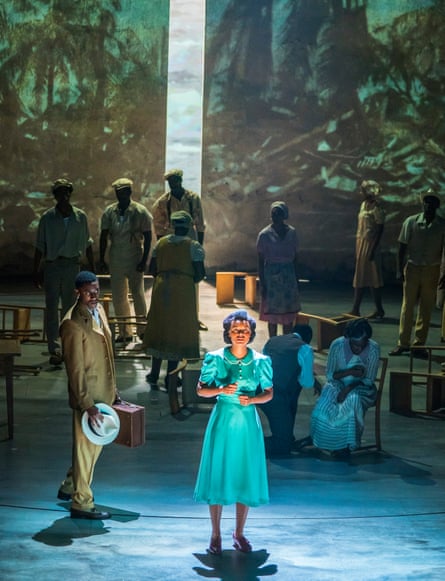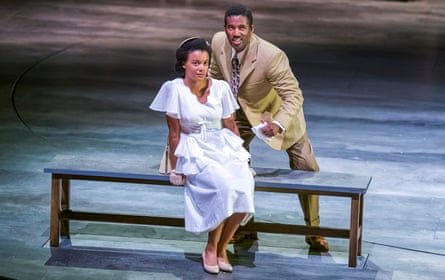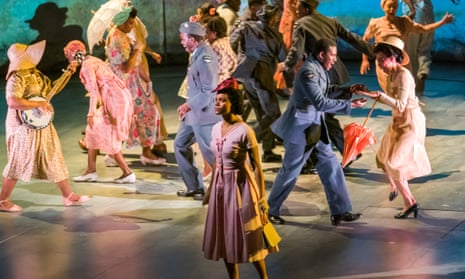Did you read Andrea Levy’s Orange prize-winning novel before coming to this production?
I had an interesting journey leading up to this play; I auditioned for a part in the TV adaptation of Levy’s The Long Song and as part of the research for that I watched [the TV adaptation of] Small Island on iPlayer. A few months later, I was auditioning to play Hortense in this production. I picked up the book and couldn’t put it down. It was quite an adventure to go on. I was reading it in the knowledge that I’d be playing this character so I was looking for secret nuggets for the part.
Unfortunately, I never met Andrea Levy, which I’m always going to be sad about. When I did a workshop in October 2018 she was too ill to be there but she was deeply involved in this adaptation. She wanted Rufus Norris to direct it and Helen Edmundson to adapt it.
Edmundson’s adaptation is a mix of dialogue, direct address to the audience, narration and song. How easy was it to burst into song or through the fourth wall?
It was a tall order, especially for actors who hadn’t been on that stage [the Olivier theatre] before – it’s a massive space. I open the play with a song, then I go into a scene with dialogue then all of a sudden I go into a direct address to the audience.

I remember working on that first scene in rehearsals. When it came to the direct address, I had to turn around to speak to the audience. I wasn’t on stage at the time but I knew what it looked like. I turned around and just curled up into a tiny ball on the floor. I felt so exposed. Everyone laughed at the strong physical reaction.
What it ultimately did [in the drama] was to open up a dialogue between the audience and the main characters. Later on in the play, we had people shouting things out like “Yes, that’s right!” or talking quietly among themselves. One person would guffaw at something that another person found offensive and that’s tense. I heard that being in the audience was an experience in itself.
Marriage is a disappointment for Hortense, who marries Gilbert out of expediency. and also for Queenie, who marries the emotionally repressed Bernard. Is this a comment on marriage for women in the 1940s and 50s?
I’ve always wanted Hortense and Queenie to have a cup of tea together and chat, because they have so much in common. They both get married to men they don’t know or get along with that well. They marry to escape the situation they’re in; Hortense marries Gilbert to travel to the ‘Motherland’ and Queenie marries Bernard so she doesn’t have to keep working in a stinking farm. But I think in both marriages they have the power.
A central part of Gilbert’s story relates to the West Indian soldiers who fought in the British army during the second world war and then became part of the Windrush generation, postwar. Did the play acquire new meaning for you in the light of the Windrush scandal of 2018?
Yes of course. We are playing pretend but the Windrush scandal makes it real. When Shiloh Coke and I first put on our costumes we both said ‘I feel real’. These clothes were what our aunties and grandmothers would have worn. Naturally, it makes you look at your own family and how it affected everybody. My grandmother turned 80 while I was rehearsing: she came to England from St Lucia and is a member of the Windrush generation. I was trying to work her out at the time and as she was giving a speech on her birthday, I thought ‘That’s Hortense!’
Jon Driscoll’s projection of rolling ocean waves in the backdrop as well as film footage of people stepping off HMT Empire Windrush is very visually striking. How did it feel to perform against this backdrop?
I didn’t see much of it until I watched the NT Live version of the play and then I thought ‘Wow, I’ve been missing out on so much!’ The sea is actually the Caribbean – they went there and filmed it.
Do you think this drama has gained greater resonance in the light of the global protests and recent resurgence of the Black Lives Matter movement?
I think it would always have meant something very big to a lot of different people, but now it bears even more resonance. It’s important we share these stories, full stop, but to make the play available – and globally available – for one week at this moment could be so big but overwhelming to think about. Even if there’s one person on the other side of the argument who gains some empathy or a different perspective by watching it, then it’s done something good.
Bernard Bligh is openly and vehemently racist to Gilbert, who experiences a lot of hostility and aggression in Britain and says that “this country is full of people like Mr Bligh”. How far do you think we have come since then?
Obviously I feel we have progressed as a country. The fact that I’m even on that stage and this story is being told in one of the biggest theatres in the country means we have progressed. Unfortunately, as we saw in the news over the weekend, there are still people who are the products of a racist system.
I was talking to my mum and she said that a thing that is so ingrained in society and is so big worldwide needs a big energy to change it. Something like this has not happened worldwide before and so everyone can see it on social media. Doing this play is a contribution to sharing the historical story of why our country is the way that it is.

Do you fear that actors will have a harder time finding work, post-lockdown, and that actors of colour might be worst affected?
I think there may not be as much work and fewer things being made overall but I don’t think it will be harder for actors of colour because of what’s happening at the moment. Hopefully we will have an influx of people from different backgrounds and get their stories into production rooms. When people say they can’t find these voices it means they are not looking for them. Excellence is out there but the system doesn’t allow them through certain gates. I was at an open mic session of The BAME Effect, a group set up by a student [Leanne Henlon] who I mentor at my old drama school, Lamda, and I heard an incredible script by Elijah J Cook and Joshua Merara. It was about being a young black man in Brooklyn and it was one of the best scripts I’d ever heard.
How has lockdown affected your professional and personal life?
I was in Ireland, filming Foundation, a new TV show for Apple TV. I play a lead role, which is really exciting, but I had to fly back home in the middle of it. I have also been going through heartbreak. Ever since drama school, I have been working consistently and done character development on all the people I’ve played. Now I’m using this time to do some character development on myself.
Small Island streams on YouTube from 7pm on 18 June as part of National Theatre at Home. It will be available until 25 June. How to make a donation to the National Theatre.
